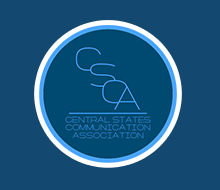About This Journal
About | Editorial Board | Policies | Style Guide | Call for Papers
Journal of Communication Pedagogy
Editor: Meggie Mapes, University of Kansas
Associate Editor: Kyle Vareberg, Northeastern State University
Submission deadline: All submissions are due before March 1, 2026, in order to be considered for Volume 10.
- mission & aims
- submission standards
- article types
- publication frequency & access
- journal policies & permissions
- indexing & abstracting
- contact
Mission & Aims
The Journal of Communication Pedagogy (JCP) is a peer-reviewed journal sponsored by the Central States Communication Association. The journal publishes only the highest quality articles that extend communication theory, research, and practice in meaningful ways.
We seek manuscripts that focus on communication education & instructional communication research situated in a variety of contexts such as (but not limited to) classrooms, health, business/industry, religious, risk/crisis, training and leadership, public relations, journalism, forensics, and nonprofits both within the borders of the United States and beyond them. We are particularly interested in diversity, equity, and inclusion research as well as the use of technology in instruction.
We also welcome communication pedagogy research that intersects with interdisciplinary and/or emerging scholarship around, for example, open pedagogy and open educational resources, online learning, and artificial intelligence. We invite scholarship that utilize quantitative, qualitative, rhetorical, critical, narrative, or performative methods.
In sum, we seek manuscripts that examine communication pedagogy as it occurs across subfields in the communication discipline, in disciplines throughout the academy, and in contexts beyond the walls of higher education.
Submission Standards
All manuscripts must adhere to the guidelines of the most recent edition of the Publication Manual of the American Psychological Association and must not have been published elsewhere or be under review for any other publication.
Article Types
The JCP will publish four types of articles: research articles, short reports, reflective essays, and best practices.
Research Articles are theory based, methodologically sound, and data-driven empirical analyses of communication pedagogy as it occurs in any context including, but not limited to traditional face-to-face or online classrooms. We welcome all methods of scholarly inquiry. The discussion section must include (a) conclusions as they extend theory and research, (b) implications that inform instructional communication practices, and (c) suggestions for future research. Manuscripts should not exceed 8500 words, including title page, abstract, tables, notes, references, and appendices.
Short Reports are research articles that replicate and/or revisit previous communication pedagogy or instructional communication research through a renewed lens on diversity, equity, inclusion, and belonging (DEIB). We welcome all methods of scholarly inquiry. The discussion section must include implications for instructional communication practices that are tied to DEIB. Manuscripts should not exceed 4500 words, including title page, abstract, tables, notes, references, and appendices. The title should begin with “Short Report.” Please submit under the “Research Article” tab and designate as “Short Report” in title and abstract description.
Reflective Essays are agenda-setting pieces focused on a thorny issue or problem inherent in communication pedagogy that educators may need to address. Reflective essays may include issues across contexts (e.g., health, business, risk, crisis, public relations, journalism, education) or in relation to individual identities, group membership(s), and/or social justice (e.g., diversity, equity, and inclusion). Each essay must clearly identify the thorny issue or problem and suggest means by which to address it. Reflective essays may be written in first person and should not typically exceed 3000 words, including title, abstract, tables, notes, references, and appendices.
Best Practices describe best practices in communication pedagogy in the classroom and other applied settings and professions (e.g., listening, empathy, civil discourse, formal presentations in face-to-face and online environments, conflict management and resolution, teamwork, gender, intercultural, leadership). These professions may range from health (e.g., doctor-patient relational communication) to business (e.g., employer-employee communication, customer service) to education, among others. Manuscripts must be grounded in research and include clearly designated best practice tips for successful implementation based on experience/assessment. Best practice articles may be written in first person and should not exceed 3500 words, including title, abstract, tables, notes, references, and appendices.
Publication Frequency & Access
Journal of Communication Pedagogy currently publishes once per year and is an open-access journal. Issues of the journal will appear at www.pedagogyjournal.com.
Journal Policies & Permissions
CSCA Permission Policy
Journal of Communication Pedagogy is published by the Central States Communication Association.
For copyright permission for an article published in Journal of Communication Pedagogy, contact the
CSCA Executive Director.
For additional journal policies, see: Policies.
Contact
For general journal inquiries, permissions, or association contact, email the CSCA Executive Director.
ISSN: Print 2640-4524 | Online 2578-2568
DOI Prefix: 10.31446 (CrossRef)
Publisher: Central States Communication Association
Publisher location: United States
Last updated: December 2025
© Journal of Communication Pedagogy. Articles are published under the Creative Commons Attribution-NonCommercial-NoDerivatives 4.0 International License (CC BY-NC-ND 4.0) .
Indexed in EBSCO, ERIC, Australian Education Index (Informit) and DOAJ.


